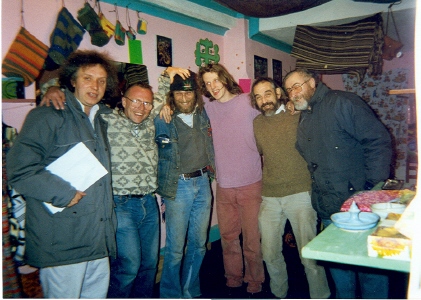
JACK GIRLING
The Origins
In 1992, a group of Norwich people had become dissatisfied with the legalise cannabis campaign at the time and felt that more action was needed.

JACK GIRLING
At the inspiration of Jack Girling of Norwich and following a particularly large local police operation with the incarceration of several people without bail on conspiracy charges, a meeting was held and the decision made to form the CLCIA (Campaign to Legalise Cannabis International Association). The aim was to campaign for the legalisation of cannabis throughout the world and to secure the release of all "cannabis prisoners" - a big task for them since they lacked both financial resources and experience. The tactic of the CLCIA was to run both political and educational programmes. The CLCIA would try to field candidates in elections in order to encourage a political debate.

GROUP OF NORWICH CAMPAIGNERS 1996
The CLCIA was founded by these Norwich people: Jack Girling, Tina Smith, Cathy Dugdale, Alun Buffry, John Davies, Bob Wilton, Ingrid Waters, Martin Wyatt, John Adam, Charlie Bristow and Alan H Smith. Howard Marks was an honorary founding member (without his knowledge as he was still in prison in the US after being kidnapped by the DEA).
Despite the strong feelings of the group, the general political climate at the time and fear of returning another Tory Government, many were against standing in the General Election of 1992.
The CLCIA introduced a membership fee a percentage of which was banked towards funding future candidates, and in 1997, after his release and return to the UK, Howard Marks consented to standing on the legalisation of cannabis as a single issue in both Norwich North and Norwich South, also in Southampton Test and Neath constituencies. His vote ranged from 1% to 1.6% - not bad for a first time party with so little funding!

BUSTER NOLAN 1997
At that election Buster Nolan stood in Braintree for the "New Millennium, New Way Cannabis Party"

DANNY TUNGATE
The next year, Danny Tungate stood on the same ticket in a local Norwich ward and gained 7.5% of the vote!
It was early in 1999 before we realised the need to register as an official UK political party with emblems, after the law had changed on how a candidate would be described on ballot papers. The new rules meant that any candidate not from a registered party could only describe himself / herself as "Independent". We also realised that if a new party used the name and emblem of the cannabis plant and its leaf, then future candidates would be unable to do so. We registered as a political party - the Legalise Cannabis Alliance - with the leaf as our emblem. Because of the law, we needed to name a leader - "for the purposes of registration only". Jack Girling took that role temporarily and Alun Buffry became the party's Nominating Officer - the guy who authorises the prospective candidates to use the party name and emblem.
It did not take long to produce a set of Principles, Aims and Proposals, a Manifesto (Cannabis: Legalise and Utilise) and to form an Administrative Committee.

ALUN BUFFRY
Alun Buffry became the Nominating Officer.
Preferring to attract endorsements to our Principles, Aims and Proposals from members of all political persuasions and parties, we opted for an endorsement scheme rather than running an immediate membership.
At about that time we met with the local Norwich Green Party after they had approached us claiming that their policies were the same as what we wanted and we ought not to stand and risk splitting the vote. In fact, we did make agreements to avoid certain wards although we were not entirely satisfied with the Green Party for going back on that.
In May 1999 and again in 2000, we had candidates in the local elections, with a god vote but once again we realised that our problem was going to be in getting our supporters to the polls on the day.

COLIN PAISLEY
In November 1999, the LCA fought our first parliamentary by-election when Colin Paisley, ex-Labour Party Mayor of Carlisle, stood in Kensington and Chelsea - a Conservative Party stronghold, against Michael Portillo and many other candidates. Colin gained only 0.7% of the vote but we know even that had a major influence on politics. This was emphasised by Derrick Large took 1.1% of the vote in a Romsey by-election in May 2002: previously though of as a safe Tory seat, it was taken by the Liberal Democrats who thanked Derrick for bringing such attention to the cannabis issue.
In 2001, the Legalise Cannabis Alliance fielded candidates in 13 constituencies in the General Election: Chris Baldwin (Worthing & East Shoreham 2.1%); Alun Buffry (Norwich South 1.5%); Patman Denning (Milton Keynes SW 1.2%), Mark Gibson (Penrith & The Border 2.0%), Leslie von Goetz (East Fife 1.2%), Linda Hendry (Edinburgh South 1.4%), Derrick Large (Romsey 1.2%), Phil Lockwood (Calder Valley 1.4%), Buster Nolan (Braintree 1.5%), Colin Paisley (Carlisle 1.6%), John Peacock (Workington 2.5%), Chris Philbin (Chelmsford West 1.4%) and Carl Wagner (Hull North 1.7%). The vote ranged from 1% to 2.5% (John). In the local elections Emma O'Neill (Halton, Appleton ward) scored over 7%, John Peacock (Solway Coast) gained 3.7%, Mark Gibson (Alston & East Fellside) 5.0% and Katie Tuff (Stockbridge & Wellow) 3.5%
By the conclusion of that election the Legalise Cannabis Alliance was established as a serious political force in the UK!
Our Aims
Our primary aim is to gain votes, but it's also important to stand in elections in order to get our message through people's doors. Our goal is the full legalisation of cannabis rather than winning us enough seats to form a Government, although our candidates in all elections would take the seat if they won it.
Beyond legalisation, we would like to see the increased utilisation of cannabis and its products for the betterment of society and the world.
The Successes
In addition to our election successes, we believe we have had a major effect on the cannabis policies of several other political parties who now favour legalisation: The Liberal Democrats, The Green Party, The Socialist Alliance, Plaid Cymru at least.
Our candidates and spokespeople have participated in numerous radio and TV debates and interviews and had numerous letters and articles published (see http://www.ccguide.org/lcapress.php).
We distributed almost 3/4 million fliers and spoke at major events and conferences. We were invited to speak at the prestigious Oxford Union Debating Chamber alongside MP's, give evidence to the Government's Home Affairs Committees special inquiry into drugs policy, and participate on a panel of experts at the Liverpool Cannabis Conference. We have participated in a number of events ranging from academic presentations at Universities to Smokey picnics and rallies.
E-mail webmaster